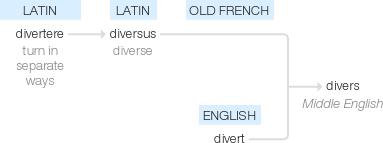Divers
Middle English: via Old French from Latin diversus ‘diverse’, from divertere ‘turn in separate ways’ (see divert).
wiktionary
See diver.
See diverse.
etymonline
divers (adj.)
late 13c., "separate, distinct; various;" late 14c., "different in kind or character" (the sense now in diverse), from Old French divers (11c.) "different, various; singular, odd, exceptional; wretched, treacherous, perverse," from Latin diversus "turned different ways," in Late Latin "various," past participle of divertere "to turn in different directions," from assimilated form of dis- "aside" (see dis-) + vertere "to turn" (from PIE root *wer- (2) "to turn, bend").
The sense of "several, sundry, more than one but not a great number" emerged by c. 1400, referring "originally and in form to the variety of objects; but, as variety implies number, becoming an indefinite numeral word expressing multiplicity" [OED].
Middle English used the spellings divers and diverse indifferently. In later use, diverse became more associated with Latin diversus "turned different ways," and after c.1700 the differentiation in form and sense was complete.
Divers implies difference only, and is always used with a plural noun; diverse (with either a singular or a plural noun) denotes difference with opposition. Thus, the evangelists narrate the same events in divers manners, but not in diverse. [Century Dictionary]
